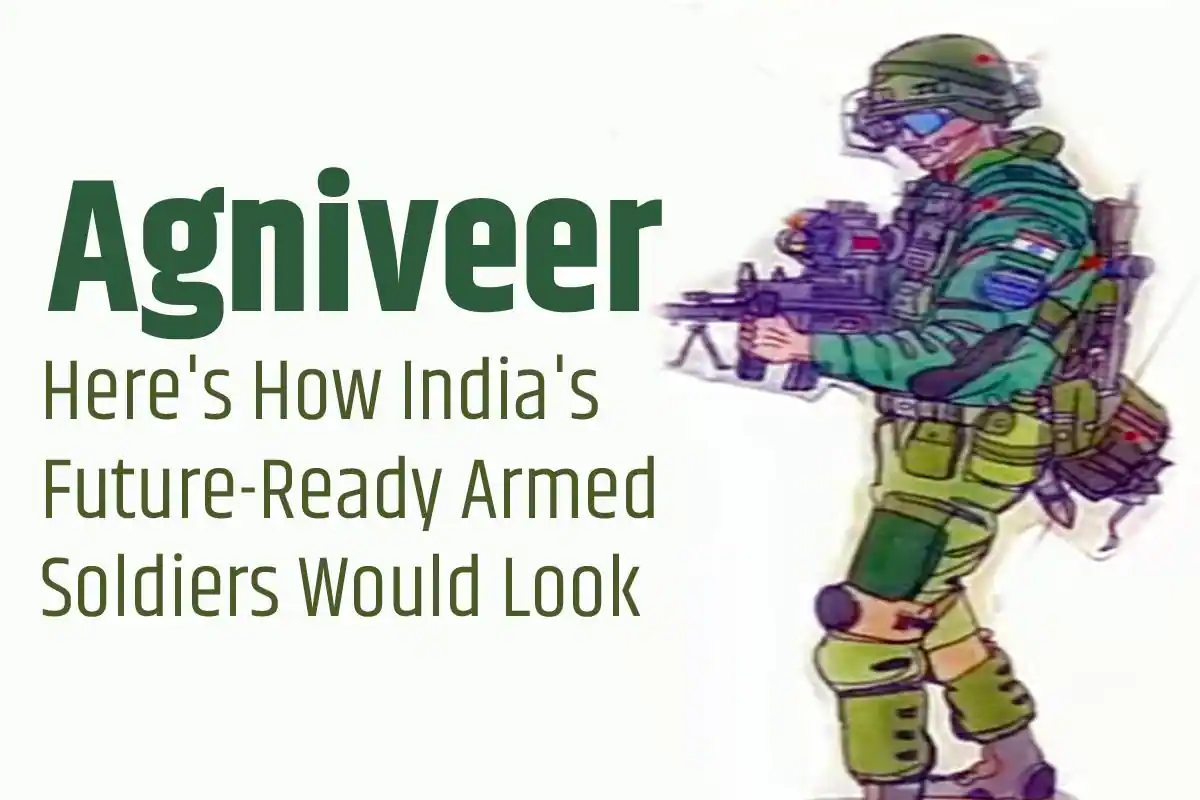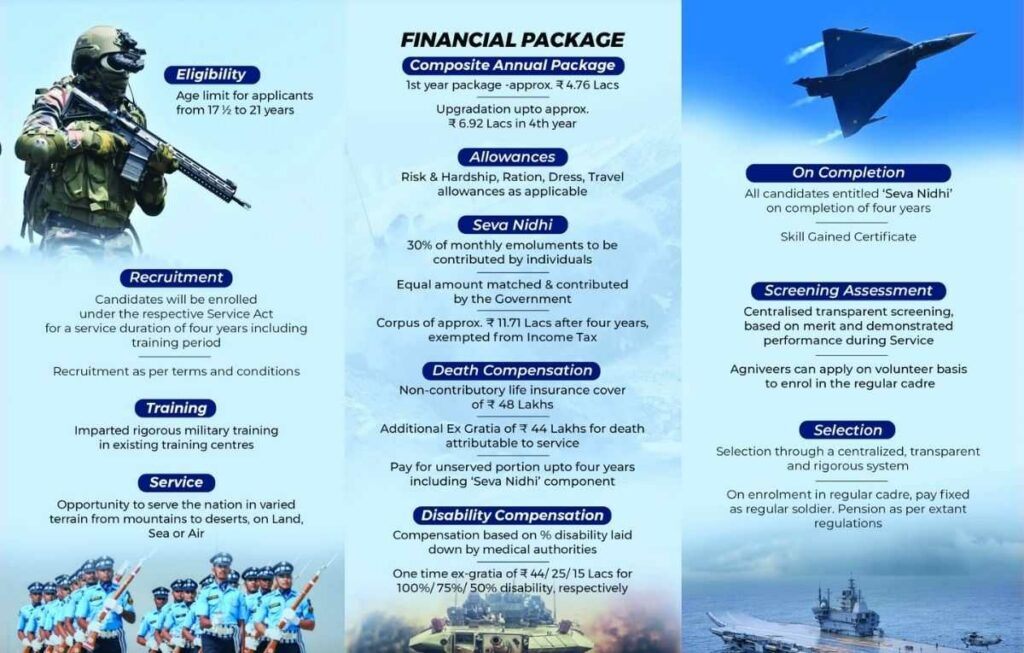
Copyright infringement not intended
In News:
- A recently published advertisement by the Indian Army announced a change in the recruitment process for Agniveers.
Earlier Recruitment Process:
- Earlier candidates had to go through a 3 steps process to join the army as soldiers;
- Step 1: Candidates to undergo the Physical fitness test.
- Step 2: After clearing Step 1, candidates undergo medical tests.
- Step 3: After clearing Step 2, candidates need to qualify common entrance examination (CEE) as the last step.
- Candidates after clearing all 3 steps were eligible to join the Indian army as soldiers.
.jpeg)
New Recruitment Process:
- In the newly published recruitment process, candidates will need to clear a 3 steps process much like the earlier recruitment process, but the order of the steps changed;
- Step 1: Candidates will need to undergo an online common entrance examination (CEE).
- Step 2: After clearing Step 1 (online examination), candidates undergo physical fitness tests during recruitment rallies.
- Step 3: After clearing Step 2, candidates need to clear the medical test as the last step.
- Candidates after clearing all 3 steps will be eligible to join the Indian army as soldiers.
Why Changed made in the recruitment process?
- In the earlier recruitment process, nearly everyone between 17½ - 21 years of age group was eligible to attend the recruitment rallies, and as the result, a large number of candidates varied from 5,000 in smaller towns to 1.5 lahks in bigger cities were joining the recruitment rallies, this stressed administrative resources.
- Under the earlier recruitment process, massive administrative costs and logistical arrangements were required to manage the thousands of candidates during recruitment rallies.
- The earlier process needed to screen a large number of candidates, which stressed administrative resources.
- A large number of security personnel were deployed to manage the law and order situations.
- A large number of medical staff had to be present for the requirement rallies.
The Expected outcome of the new recruitment Process:
- The new process will greatly reduce the costs involved in organising recruitment rallies by lessening the administrative and logistical burden.
- Under the new process, candidates need to clear the common entrance examination (CEE) as the first screening step, this will ensure that better-qualified candidates will be examined for their physical fitness and then medical tests before joining the army.

About AGNIVEER:
- In June 2022, the Indian government announced the Agnipath scheme for the armed forces intending to transform the process of recruitment of soldiers, sailors and airmen into the Defence Services.
- The soldiers to be recruited under the scheme will be called "Agniveer".
- The new system is only for personnel below officer ranks.
- Under the scheme, Agniveers will be recruited for 4 years, after which about 25% of Agniveers will be selected for permanent service in the Armed Forces.
- Soldiers selected for permanent service (after 4 years) would be required to serve for a minimum of 15 years more.
- In the long term, the army will adopt a policy of a 50:50 mix of Agniveers and regular soldiers.
- The objective of the AGNIPATH Scheme is to encourage youth to serve in the Armed Forces for a limited period (4 years), including a training period of 6 months.
- They will get an attractive monthly package with Risk and Hardship allowances.
- They will be paid a one-time Seva Nidhi package after the engagement of four years.
- It will be exempt from Income Tax.
- They will start with a monthly salary of Rs 30,000, which will go up to Rs 40,000 in the fourth year.
- One-third of the salary will go into the Agniveer Corpus Fund, with an equal contribution will be made by the government.
- At the end of four years, an accumulated amount of Rs 11.71 lakh would be paid to each Agniveer.
- There shall be no entitlement to gratuity and pensionary benefits.
- They will get a non-contributory Life Insurance Cover of Rs 48 lakh during their service in the Indian Armed Forces.

Copyright infringement not intended
Recent Update:
- The government has announced various schemes to open a second carrier (after 4 years) option for the Agniveers.
- The Education Ministry has launched a special bachelor’s degree programme for serving defence personnel to recognise the skill training received by them during their service tenure.
- 10% reservation in jobs in central police forces, Assam Rifles, and civilian posts in the Ministry of Defence.
- The Indian Army has signed agreements with 11 banks including the private sector banks like HDFC Bank, ICICI Bank, Axis Bank etc for providing banking facilities to Agniveers on enrolment.
- Under the earlier recruitment process; 19,000 Agniveers have joined the Army and 21,000 will join the force in March 2023.
- The new recruitment rules will apply from the next recruitment cycle of 2023-24.
- The Centre has decided to increase the upper age limit in the eligibility criteria of the Agnipath scheme from 21 years to 23 years.
Concerns
- There are several concerns raised on various issues like the military's ethos, professionalism, and operational capability.
- Serving the army is not just a job but an opportunity to serve and defend the nation where individuals are ready to sacrifice all, but the temporary nature of agniveers service could weaken the bond between them and regular soldiers and could promote self-interest in their actions.
- The major question is whether the Agniveers could maintain the same morale and motivation levels as regular soldiers:
- The competition among the Agniveers for the 25% permanent posts could weaken the strength of the army unit.
- Shortening the training period to 6 months could affect operational effectiveness.
- This short-term nature of service would discourage the youth from taking a military career.
- This could affect the quality, efficiency and commitment of soldiers that will join the armed forces.
Way Forward:
- Agnipath Scheme will positively impact the Human Resources Management of the Armed Forces.
- With the entry of Agniveers, the average age profile of the armed forces will decline from 32 years to 26 years.
- Younger soldiers would be fitter and will be able to operate more efficiently in the highly challenging landscape along Indian borders.
- They will be better at adopting and handling the modern equipment that is being introduced into the armed forces.
- With the provision of retaining only 25% of Agniveers for permanent service, the army could pick the best among them.
- It will cut down the rising pay and pension budget of the government and will improve financial management and efficiency.
- The saved money could be invested in modernisation and technological upgradation in the army.
- Agnipath scheme is the biggest human resources management transformation in the Indian army and with the implementation, the army will become a “future-ready fighting force, capable of meeting multiple security challenges”

https://indianexpress.com/article/india/agniveer-recruitment-process-changed-candidates-to-sit-for-entrance-test-first-8423029/
Consider the following statements about Agniveers:
- Agniveers will be recruited for 4 years, after which about 5o% of Agniveers will be selected for permanent service in the Armed Forces.
- They will go through 2 months training period.
- They will get a non-contributory Life Insurance Cover during their service in the Indian Armed Forces.
Which of the following statements is/are incorrect?
(A) 1 and 2 only
(B) 2 and 3 only
(C) 1 and 3 only
(D) 1, 2 and 3
Answer: A
Explanation
Statement 1 is incorrect: Under the scheme, Agniveers will be recruited for 4 years, after which about 25% of Agniveers will be selected for permanent service in the Armed Forces.
Statement 2 is incorrect: The objective of the AGNIPATH Scheme is to encourage youth to serve in the Armed Forces for a limited period (4 years), including a training period of 6 months.
Statement 3 is correct: They will get a non-contributory Life Insurance Cover of Rs 48 lakh during their service in the Indian Armed Forces.
Main Question: How Agniveer scheme will change the structure and management of the Defense forces? Discuss the significance of the scheme in light of recent events.





